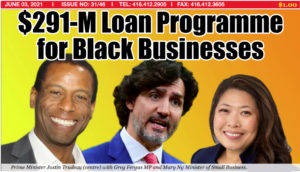By Lincoln DePradine

The Canadian government is pumping an additional $291 million into assisting Black businesses, saying it’s a further investment in breaking down barriers that confront African-Canadian entrepreneurs.
“For far too long, Black Canadians have faced systemic barriers when it comes to starting or growing a business,’’ Prime Minister Justin Trudeau said Monday, as his Liberal Party government unveiled the Loan Fund of the Black Entrepreneurship Program (BEP)
“Black entrepreneurs and business owners in Canada, our government has heard you and we’re working with you. Because we know that to rebuild an economy that works for everyone, we must break down the barriers you face to create real economic inclusion.’’
The Loan Fund is the third pillar of the Black Entrepreneurship Program that was launched last September.
The Loan Fund is administered by the Federation of African Canadian Economics (FACE), a federally incorporated not-for-profit. FACE was created by several prominent not-for-profit Black-led business groups that include the Toronto-based Black Business and Professional Association.
FACE began accepting loan applications from Monday. “Today is about long-term change’’, said Mary Ng, the minister responsible for small business; while Greg Fergus – chairman of the Parliamentary Black Caucus and parliamentary secretary to Prime Minister Trudeau – described the occasion as an “important’’ day.

The prime minister, in his remarks, said his government has been “focusing a lot on building back better. Today, we’re here to take yet another step in making that stronger, more equal future a reality for all Canadians’’.
Ng, who is also minister of export promotion and international trade, said she was “excited’’ at the launch of the BEP’s Loan Fund.
“With today’s announcement, the Black Entrepreneurship Program is now an over $400 million investment,’’ said Ng.
“We know that many Black business owners and entrepreneurs face barriers to accessing capital to support their business. We know how important it is that we deliver solutions, co-developed with black business organizations to address the unique needs of Black businesses and to ensure lasting change. We have an opportunity and a responsibility to address systemic barriers facing Black entrepreneurs.’’

Under the Loan Fund that came into effect Monday, “Black entrepreneurs and business owners across the country can apply through FACE for loans from $25,000 to $250,000,’’ Ng explained. “Altogether, this Loan Fund represents a total investment of $291.3 million to support the success of Black entrepreneurs.’’
According to the minister, loan applications are being accepted “on a rolling basis. For those in this first phase of the Loan Fund, our government is investing $33.3 million’’.
One of the criteria for obtaining a loan is that “businesses must be majority Black-owned’’.
They also should have a business plan; produce recent financial statements or have “financial projections for startups’’, said Ng, adding that applicants will be assisted in the application process by FACE.
As part of its commitment to helping Black entrepreneurs, the federal government soon will also be launching a “micro loan pilot project’’ in Ontario and British Columbia.

“We’re going to be providing micro lending in the range of $10,000 to $25,000 to Black entrepreneurs in partnership with FACE,’’ Ng said.
Another pillar of the Black Entrepreneurship Program is what’s known as the “National Ecosystem Fund’’, which will provide Black-owned businesses with “critical mentorship and training’’, said Ng. “We would be announcing the successful recipients of the Ecosystem Fund in the coming weeks’’.
A recent survey of 342 Black entrepreneurs, commissioned by the African Canadian Senate Group, found three-quarters of respondents said their race makes it harder to succeed in business, with systemic racism, access to capital and the lack of a business network all cited as barriers to growth.


